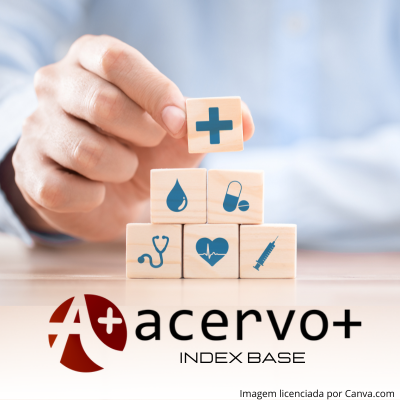Letramento em saúde nas doenças raras
##plugins.themes.bootstrap3.article.main##
Resumo
Objetivo: Sintetizar evidências científicas sobre letramento em saúde para cuidadores e pessoas com doenças raras. Métodos: Revisão integrativa da literatura, conduzida em 06 etapas, nas bases de dados PUBMED, SCOPUS e MEDLINE via portal BVS, nos idiomas inglês e português, sem limite temporal, utilizando os descritores combinados entre si por meio de operador booleano AND. Resultados: Obtido amostra de 8 artigos, sendo eleito 4 categorias: Letramento em saúde para produção de materiais de apoio para familiares, cuidadores, e pessoas com doenças raras; Letramento em saúde na transição de cuidados para pessoas com doenças raras; Letramento em saúde e Qualidade de Vida Relacionado à Saúde para pessoa com doença rara e Letramento em saúde e empoderamento nas doenças raras. Considerações finais: O letramento em saúde nas doenças raras ainda cursa com escassez a nível global. São necessários o incentivo a novos estudos para que no futuro expanda a rigor a definição do termo letramento em saúde no aspecto multidimensional, focando a pessoa com doença rara no centro do cuidado, envolvendo família, cuidador e a pessoa com doença rara para promoção de sistemas sustentáveis e equânime.
##plugins.themes.bootstrap3.article.details##
Copyright © | Todos os direitos reservados.
A revista detém os direitos autorais exclusivos de publicação deste artigo nos termos da lei 9610/98.
Reprodução parcial
É livre o uso de partes do texto, figuras e questionário do artigo, sendo obrigatória a citação dos autores e revista.
Reprodução total
É expressamente proibida, devendo ser autorizada pela revista.
Referências
2. BADIU C, et al. Developing and evaluating rare disease educational materials co-created by expert clinicians and patients: the paradigm of congenital hypogonadotropic hypogonadism, Orphanet Journal of Rare Diseases, 2017; 12 (57).
3. CALCATERRA V e ZUCCOTTI G. Non-Communicable Diseases and Rare Diseases: A Current and Future Public Health Challenge within Pediatrics, Children 2022, 9, 1491.
4. CHENG PC, et al. Transition of patients with neuromuscular disease and chronic ventilator-dependent respiratory failure from pediatric to adult pulmonary care. Paediatric Respiratory Reviews, 2020; 33: 3-8.
5. CORDEIRO MD e SAMPAIO HAC. Aplicação dos fundamentos do letramento em saúde no consentimento informado. Rev. bioét., 2019; 27(03): 410-8.
6. DIMITRI P, et al. Accelerating digital health literacy for the treatment of growth disorders: The impact of a massive open online course, Frontiers in Public Health, 2023; 11.
7. FALCÃO M, et al. A Community-Based Participatory Framework to Co-Develop Patient Education Materials (PEMs) for Rare Diseases: A Model Transferable across Diseases, International Journal of Environmental Research and Public Health, 2023; 20 (2): 968.
8. FERREIRA CR. The burden of rare diseases, Am J Med Genet, 2019; 1–8.
9. FRANCISCO R, et al. A Participatory Framework for Plain Language Clinical Management Guideline Development, International Journal of Environmental Research and Public Health, 2022; 19 (20): 13506.
10. FREDERICO P. Alfabetização, letramento ou literacia em saúde? Traduzindo e aplicando o conceito de Heath literacy no Brasil. Ciência & Saúde Coletiva, 2023; 28(5):1563-1573.
11. GRASEMANN C, et al. Transition for adolescents with a rare disease: results of a nationwide German project, Orphanet Journal of Rare Diseases, 2023; 18 (93).
12. JACKSON AD et al. Associations between health literacy and patient outcomes in adolescents and young adults with cystic fibrosis. European Journal of Public Health, 2019; 30 (01): 112–118.
13. KANEJIMA Y, et al. Impact of health literacy in patients with cardiovascular diseases: A systematic review and meta-analysis. Patient Education and Counseling, 2022; 105 (07): 1793-1800.
14. KIM K, et al. The Relation Between eHealth Literacy and Health-Related Behaviors: Systematic Review and Meta-analysis. J Med Internet Res, 2023; 25: e40778.
15. MENDES KS, et al. Revisão integrativa: método de pesquisa para a incorporação de evidências na saúde e na enfermagem. Texto Contexto Enferm, 2008; 17(4): 758-64.
16. NGUYEN CQ, et al. ‘Advocacy groups are the connectors’: Experiences and contributions of rare disease patient organization leaders in advanced neurotherapeutics. Health expectations, 2022; 25: 3175–3191.
17. NUTBEAM D. Health literacy as a public health goal: a challenge for contemporary health education and communication strategies into the 21st century. Health Promotion International, 2000; 15(03): 259–267.
18. NUTBEAM D e LLOYD JE. Understanding and Responding to Health Literacy as a Social Determinant of Health, Annual Review of Public Health, 2021; 42:159–73.
19. PAGE MJ, et al. The PRISMA 2020 statement: an updated guideline for reporting systematic reviews. BMJ, 2021;372(71):1-9.
20. RIEMANN L, et al. The Role of Health Literacy in Health Behavior, Health Service Use, Health Outcomes, and Empowerment in Pediatric Patients with Chronic Disease: A Systematic Review. International Journal of Environmental Research and Public Health, 2021; 18(23): 12464.
21. SANTIS MD, et al. Patient empowerment of people living with rare diseases. Its contribution to sustainable and resilient healthcare systems, Ann Ist Super Sanità, 2019; 55 (3): 283-291.
22. SCHMIDT TJ, et al. Health-related quality of life and health literacy in patients with systemic mastocytosis and mast cell activation syndrome, Orphanet Journal of Rare Diseases, 2022; 17(295).
23. SHOURICK J, et al. Assessing rare diseases prevalence using literature quantification, Orphanet J Rare Dis, 2021; 16: 139.
24. SMITH SA e CARBONE ET. Reintegrate Empowerment and Health Literacy to Advance Public Health and Healthcare Delivery, Stud Health Technol Inform, 2020; 269:369-399.
25. URSI ES e GAVÃO CM. Prevenção de lesões de pele no perioperatório: revisão integrativa da literature, Rev Latinoam Enferm., 2006; 14(1):124-131.
26. VERWEEL L, et al. The effect of digital interventions on related health literacy and skills for individuals living with chronic diseases: A systematic review and meta-analysis. International Journal of Medical Informatics, 2023; 177: 105114.
27. WORLD HEALTH ORGANIZATION (WHO). Health literacy toolkit for low- and middleincome countries. Regional Office for South-East Asia, 2014.
28. WORLD HEALTH ORGANIZATION (WHO). Health promotion glossary of terms 2021. Geneva: World Health Organization, 2021. Licence: CC BY-NC-SA 3.0IGO.
29. WORLD HEALTH ORGANIZATION (WHO). Promoting health in the SDGs. Geneva, 2016.
30. ZHENG M, et al. The relationship between health literacy and quality of life: a systematic review and meta-analysis. Health and Quality of Life Outcomes, 2018; 16 (201).

